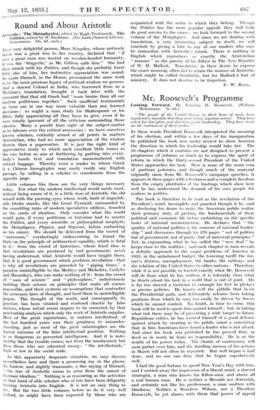Round and About Aristotle TIIAT very delightful person, Mary Kingsley,
whose untimely death was a great loss to her country, declared that "if ever a great man was wasted on wooden-headed humanity, it was the Stagyrite,' as Mr. Gibbon calls him." She had been struck with his Politics, and though she probably knew little else of him, her instinctive appreciation was sound. So again Disraeli, in the House, pronounced the same work to be the most precious legacy of political wisdom we possess. And a shrewd Colonel in India, who borrowed from us a Welldon's translation, brought it back later with the comment that that old Greek had "more brains than all our modern politicians together." Such unofficial testimonials as these are in one way more valuable than any learned decisions : so might a man study his Shakespeare or his Bible, fully appreciating all they have to give, even if he were totally ignorant of all the criticism surrounding those classics. Many a pundit loses sight of the subject-matter as he labours over the critical accessories : we have ourselves known scholars, critically armed at all points in matters Aristotelian, who had no more appreciation of the wisdom therein than a papercutter. It is just the right kind of appreciative study to which such excellent little tomes as the two before us aim at furthering by .putting into every- body's hands text and translation unencumbered with critical baggage. Thereby even a reader to whom Greek is a Chinese hieroglyphic may easily verify any English passage, by calling in a scholar to corroborate from the opposite page.
Little volumes like these are the very things necessary today. For what the modern intellectual world needs most, without being aware of it, is a little dose of Aristotle, the old wizard with the piercing eyes, whose work, built of imperish- able blocks stands, like the Great Pyramid, surrounded by the crumbling ruins of modern speculative edifices, founded on the sands of idealism. Only consider what the world would gain, if every politician or historian had to master the Polities, and every scientific or philosophical neophyte, the Metaphysics, Physics, and Organon, before embarking on his career. We should be delivered from the crowd of "statesmen," everlastingly endeavouring to found the State on the principle of arithmetical equality, which is fatal to it : from the crowd of historians, whose fixed idea is that revolutions are produced by bad government, never having understood, what Aristotle would have taught them, that it is good government which produces revolution—that is why all revolutions are preceded by "piping times," a paradox unintelligible to the Motleys and Michelets, Carlyles and Macaulays, who can make nothing of it: from the crowd of "men of science" and. "philosophers," industriously building their' science on principles that make all science impossible, and their systems on assumptions that contradict the necessary laws of thought, and land them in unintelligible jargon. The thought of the world, and consequently its practice, has been vitiated and rendered chaotic by false doctors, whose initial errors require to be corrected by that penetrating analysis which only the work of Aristotle supplies. Most of the great reputations, in matters intellectual, of the last hundred years owe their greatness to misunder- standing, just as most of the great catastrophes are the logical outcome of the false intellectual position. Nothing IS so dangerous as perverted intelligence. And it is note- worthy that the trouble comes, not from the uneducated, but from those who are educated wrong : "the intellectuals," high or low in the social scale.
In this apparently desperate situation, we may discern nevertheless here and there a promising ray in the gloom. To borrow, and slightly transmute, a fine saying of Disraeli, "the star of Aristotle seems to arise from the sunset of German idealism." Nothing is so reassuring as the activities of that band of able scholars who of late have been diligently turning Aristotle into English. It is not an easy thing to do, But the two little volumes before us do it very well indeed, as might have been expected by those who are acquainted with the series to which they belong. Theugh the Politics has the more popular appeal, they will both do good service to the cause : we look forward to the second volume of the Metaphysics. And since we are dealing with translation, a very interesting subject in itself, we will conclude by giving a hint to any of our readers who may be unfamiliar with Aristotle's Greek. There is nothing in English which reproduces so exactly the Aristotelian " manner " as the parody of his Ethics in The New Republic of W. H. Mallock. Translators, in their desire to express the exact meaning, often fail to retain the manner of Aristotle, which might be called inimitable, but for Mallock's feat of mimicry. It does not deserve to be forgotten.
F. W. BAIN.
































 Previous page
Previous page